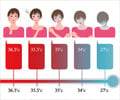Intravenous delivery of cold fluids to reduce body temperature quickly after a heart attack and improve neurologic outcomes may not be as effective in children as it is in adults.
Intravenous delivery of cold fluids to reduce body temperature quickly after a heart attack and improve neurologic outcomes may not be as effective in children as it is in adults, according to a study.
In adults, therapeutic hypothermia to minimize neurological complications caused by cardiac arrest can be achieved by rapidly infusing cold (4oC) intravenous fluid. However, this might not be the optimal approach in children. Alexis Topjian, Michael Hamid, Larissa Hutchins, and Vinay Nadkarni, The Children's Hospital of Philadelphia, University of Pennsylvania School of Medicine, studied the effect of the infusion rate on the temperature of the cold IV fluid in three simulated pediatric patients of different weights. They describe the study design and their results in the article entitled, "Can a Cold (4oC) IV Fluid Bolus to Induce Therapeutic Hypothermia Really Deliver 4oC to Children?"
"This is an important and timely contribution because it reinforces the point that children are not just small people but require specialized treatment strategies to target pediatric CNS injury," says Editor-in-Chief W. Dalton Dietrich, PhD, Kinetic Concepts Distinguished Chair in Neurosurgery, Professor of Neurological Surgery, Neurology and Cell Biology and Anatomy, University of Miami Leonard M. Miller School of Medicine.
Source-Eurekalert















